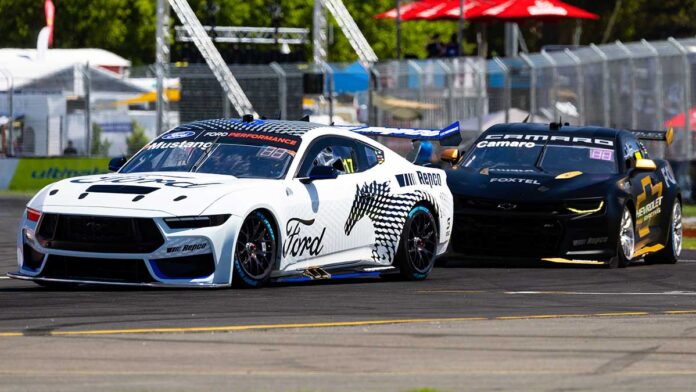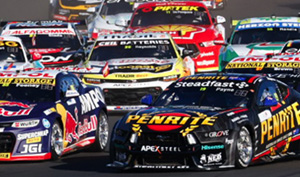FORD has broken its public silence on an ongoing dispute with Supercars over parity between the Gen3 Mustang and Chevrolet Camaro.
Addressing media this morning, global Ford Performance boss Mark Rushbrook confirmed Ford is yet to be satisfied that engine and aerodynamic parity has been reached.
Robust discussions between Ford and Supercars have been ongoing since last November, when the Blue Oval refused to sign off on the category’s VCAT aerodynamic test results.
The Mustang has largely been slower than the Camaro during track testing, resulting in further analysis of both the new engine and body packages.
That included more track running at Queensland Raceway last month, with two days focused on refining the Ford engine and another involving direct comparisons with the Camaro.
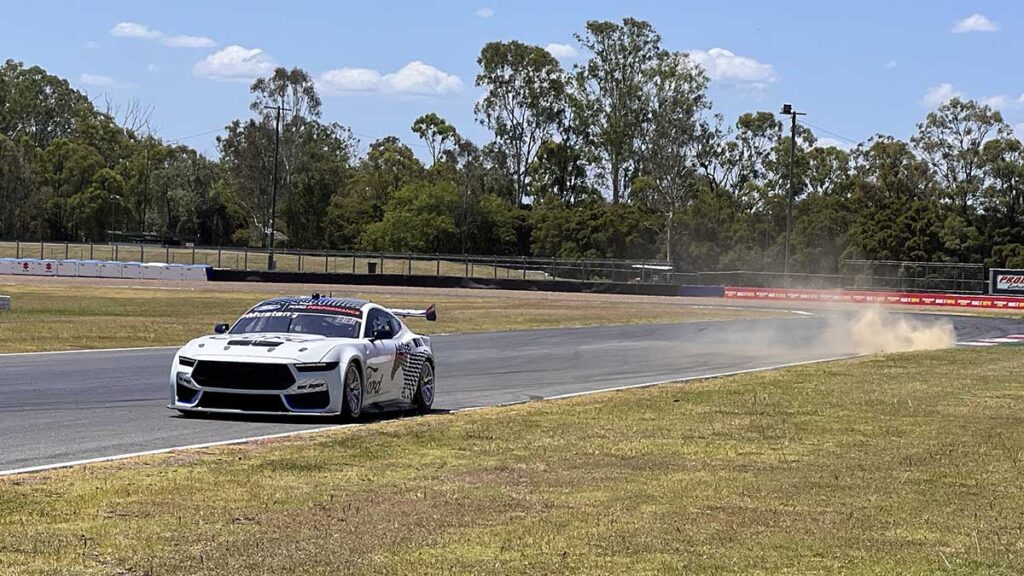
Although Ford has been pushing for more straightline aerodynamic testing, Supercars is yet to commit to a return to the runway as its Newcastle season opener fast approaches.
“I think the industry, the media certainly has sensed or heard bits that, as a manufacturer and aligned completely with all of our racing teams, that we are not satisfied that parity has been reached either for engine or aero,” he said.
“That goes back to some of the VCAT testing that was done, and when we left there not satisfied that parity had been achieved and also, more recently, with some of the testing, comparative testing that was done on track that the acceleration of the cars down the straightaway is not equivalent.
“Certainly (there) are some concerns there, but we’re working together in a very transparent, collaborative way, just like we do in all other racing series around the world, with the series and with Triple Eight as a competitor, as the lead (Chevrolet) homologation team, to find solutions for that.
“We were in a very similar situation in NASCAR about two months before we went racing with the NextGen cars a little over a year ago.
“The industry came together in a very collaborative way where Chevy and Toyota and Ford and NASCAR and all of the racing teams rolled up our sleeves and we shared data, and we looked at it objectively as engineers, and we found solutions and made changes to the cars.
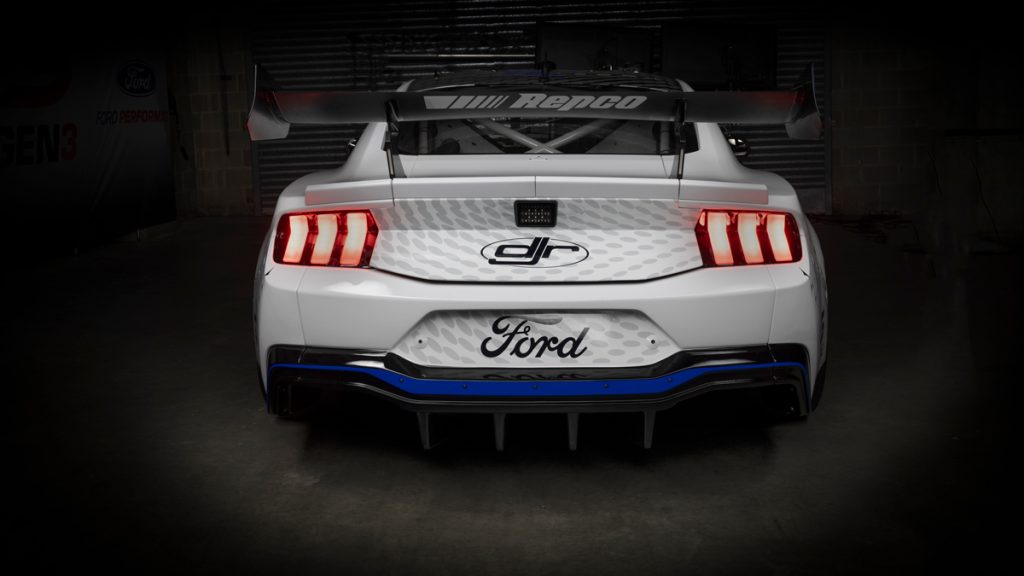
“Less than two months later, we had a start of fantastic season and introduction of that new car and great racing through the full series.
“We approach that in the same way in every racing series that we go to, and it’s no different here.
“While there are certainly challenges in front of us, we believe the series understands the urgency that’s required – Newcastle’s not too far away – and that we’re looking forward to a solution to be able to race with parity across both brands.”
The new Gen3 ruleset includes new engine packages for both Ford, utilising its 5.4-litre, double overhead cam Coyote, and Chevrolet, running a 5.7-litre pushrod unit.
Issues with the Ford engine are understood to be centred around its interaction with Supercars’ control MoTeC electronics.
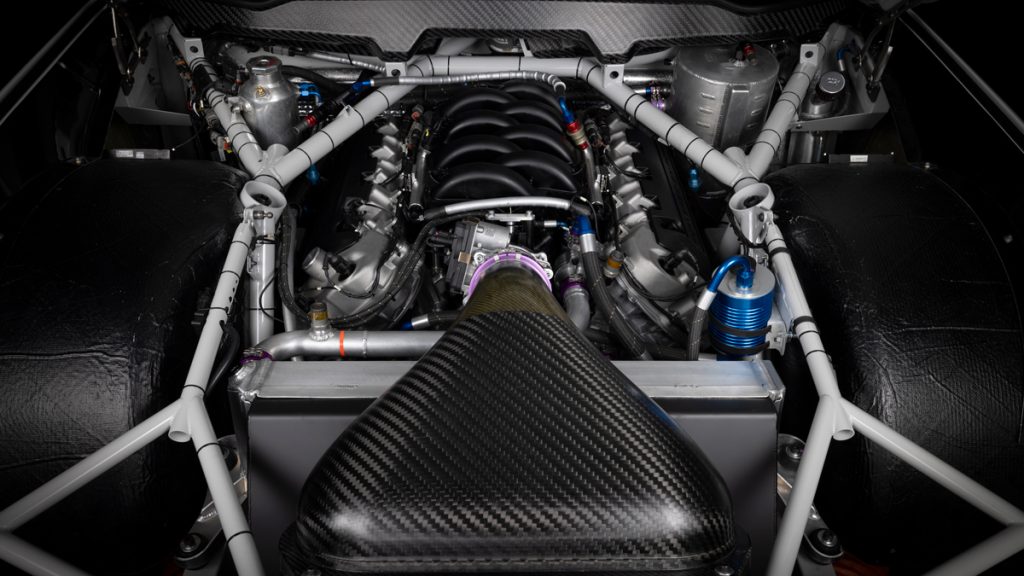
“I think everybody knew, when we started the Gen3 project, that it was going to be a challenge to balance, to have proper parity between two very different engine architectures, and I think we’re seeing some of that play out at this point in time,” Rushbrook said.
“There have been points in time where if you look at our engine and some of the advanced technologies on it with what we’re able to do with that engine on the road car, we’re not able to do the same things in the race car, on the race engine.
“Some of those knobs and controls have been turned off. That is the frustrating part, I think, for us.
“We take that same base engine, as a Coyote-based engine, and we’re able to meet the regulations and meet the parity or the balance in other racing series around the world, so there’s certainly not a lack of capability in that engine or the team that’s developing it, so I don’t have any kind of lack of confidence or concerns with that.
“It’s a matter of their very different architectures and the process that’s being used to balance it, and I think similar for aero.
“I think we showed when we brought the (Gen2 Mustang) that the people from Ford Performance developing that car are very capable to develop a fantastic race car and you saw that on the debut of that car, and it’s the same people that worked on the development of this body.
“So again, not worried about the confidence or capability of the team that’s developed it. It’s just a matter, I think, of following the process and establishing that parity and being able to go race that way.”
The Blanchard Racing Team on Wednesday became the first Supercars squad to run a Gen3 race car, following extensive testing of the category’s own prototypes.


